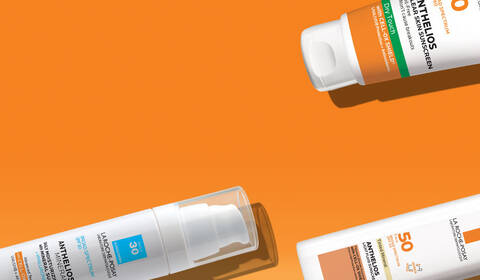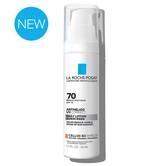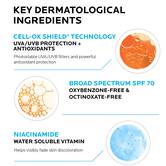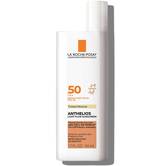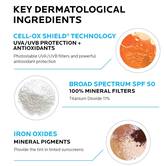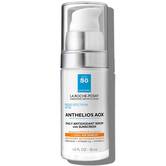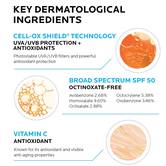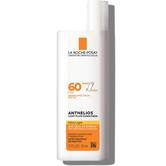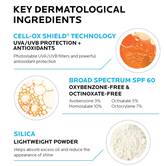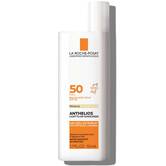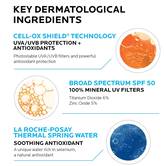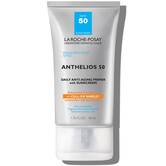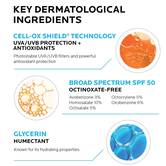What is Cell-Ox Shield® technology?
Cell-Ox Shield ® Technology is La Roche-Posay’s combination of Broad Spectrum UVA/UVB filters and powerful antioxidant protection, found in our best face sunscreens for sensitive skin:
Broad Spectrum UVA/UVB filters: Combines photostable UVA/UVB filters chosen for their synergistic effect to deliver broad spectrum protection. Available in daily protection formulas, as well as water resistant formulas up to 80 minutes.
Powerful Antioxidant Protection: with Senna Alata, a tropical leaf extract known to help neutralize damaging free radicals that can accelerate skin aging.
What are La Roche-Posay's best face sunscreens for sensitive skin?
All La Roche-Posay face sunscreens are suitable for sensitive skin.
What is La Roche-Posay's best facial sunscreen for acne prone skin?
All La Roche-Posay face sunscreens are oil-free or non-comedogenic, meaning they won’t clog pores. Anthelios Clear Skin Oil Free Sunscreen SPF 60 is tested on acne-prone skin.
Does La Roche-Posay offer mineral sunscreens for face?
Yes, La Roche-Posay offers an assortment of 100% mineral UV filter (i.e. physical) formulas with titanium dioxide and zinc oxide that can be found Mineral Sunscreen
How much SPF do you need for face?
In general, it is recommended to apply a nickel-sized amount of sunscreen to the entire face daily. If you are at the beach or pool or in direct sunlight, it is recommended to apply 1 shot glass amount of sunscreen to the entire exposed skin. In general, the sun’s rays are strongest typically around 10am to 4pm and so it is recommended to be diligent about SPF and sun protection for the face during this time of day . A helpful tip: When your shadow is shorter than you are….seek shade!
Can I use regular sunscreen on my face?
When applying a sunscreen to your face, it is recommended to use spfs for face specifically to avoid acne breakouts and skin irritation, especially in individuals with acne-prone, oily skin. A helpful tip is to look for facial sunscreens labeled as “non comedogenic” (meaning it won’t block your pores) or for “acne-prone” skin.
Should I wear sunscreen on my face every day?
The Skin Cancer Foundation recommends applying sunscreen every day at least 15 minutes prior to sun exposure and reapply at least every 2 hours and immediately after swimming or sweating to help decrease your risk of skin cancers and skin pre-cancers, and help prevent premature skin aging caused by the sun. Even when it’s cloudy, up to 80 percent of the sun’s UV radiation reaches the earth. Not protecting your skin with SPF every day, even on an overcast day, can lead to sun damage.
What time can I stop wearing sunscreen?
The sun’s rays are strongest typically around 10am to 4pm all year round so it is recommended to be diligent about SPF and sun protection during this time of day. Nonetheless, when there’s sunlight, there’s potential for a burn – especially if you’re fair-skinned and burn easily.
Do face sunscreens cause acne breakouts?
Facial sunscreens that are labeled non-comedogenic (meaning it won’t block your pores) have been tested for daily facial use in individuals with acne-prone, oily skin. With that being said, individuals with acne-prone, oily skin are often advised to test the facial sunscreen on a small area on the face prior to full facial application. We recommend our non-comedogenic Anthelios Clear Skin Oil Free Sunscreen SPF 60 for those with acne prone- and oily skin.
Do I apply my face sunscreen before or after moisturizer?
Incorporating sunscreen into your daily skin care regimen is critical in helping decrease the risk of skin cancer and early skin aging. As a rule of thumb, you should apply sunscreen as the last step in your skin care routine before applying makeup to help protect skin from damaging UV rays.
How often should you reapply sunscreen to your face during the day?
For sun protection, the FDA recommends reapplying sunscreen every 2 hours. However, washing your face or applying sunscreen on top of your makeup may not seem practical. Using a tinted sunscreen for face such as Anthelios Mineral Tinted Sunscreen for Face SPF 50, allows for easy application with makeup throughout the day. Look for water-resistant facial sunscreens if you are swimming or perspiring.
Does sunscreen prevent aging?
According to the Skin Cancer Foundation, when used as directed, sunscreen is proven to decrease your risk of skin cancers and skin pre-cancers, and help prevent premature skin aging caused by the sun, including wrinkles, sagging and age spots.
Choosing a sunscreen that contains both UVA and UVB coverage is essential for skin cancer prevention and prevention of premature skin aging.



